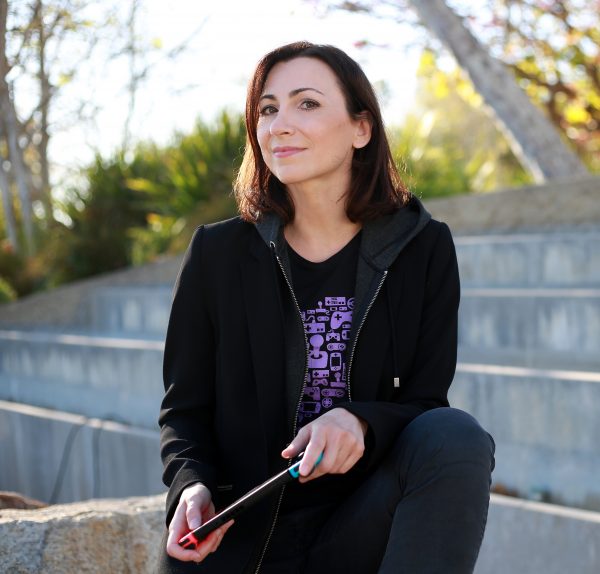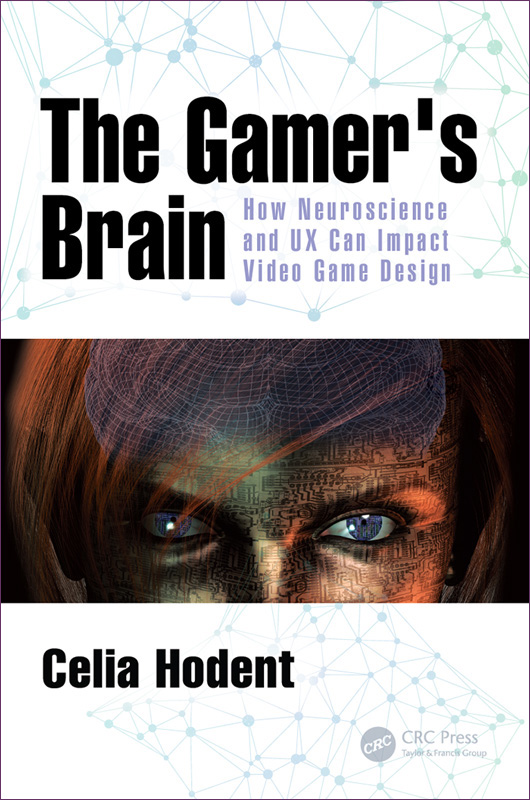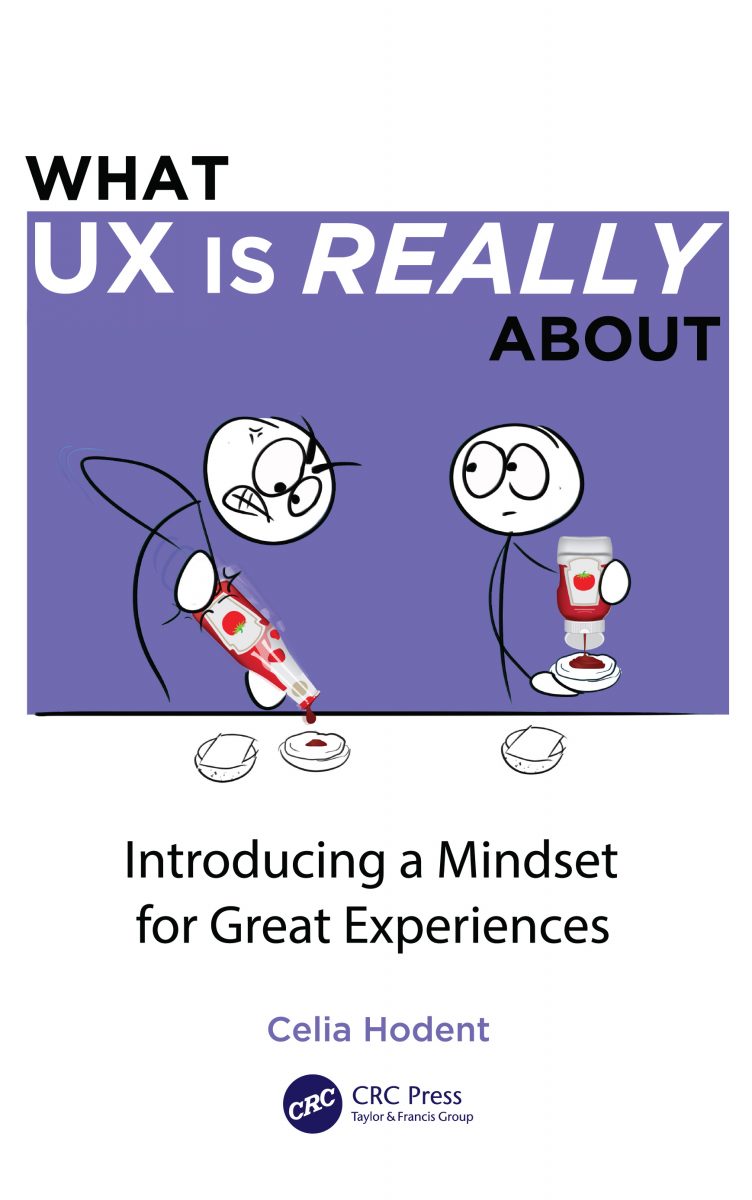Celia Hodent, PhD is an expert in game UX (user experience) and cognitive psychology. She is a consultant, speaker, and acclaimed author of The Gamer’s Brain: How Neuroscience and UX can Impact Video Game Design & The Psychology of Video Games.

I have a PhD in Psychology from the University of Paris 5 Sorbonne (France). I’m specialized in cognitive development (my thesis was about language-specific effects on number computation in toddlers). The performance, limitations, and biases of the human brain will never cease to fascinate me.
I’m the GDC UX Summit Chair and an adviser for the GDC UX Summit, so I’m always looking for interesting speakers to talk about Game UX for the conferences I help curate.
Having a UX mindset means putting humans first; putting users’ (players’) interests above business goals. Which is why I care about ethics and kicked off the Ethical Games initiative with academics and game developers.
2005 – 2009I grew up playing a lot of games, including video games; because of this I felt compelled to walk away from academic research and enter the gaming industry. I first joined Vtech, a toy and educational game manufacturer, in 2005.
In 2008, I started an exciting quest about how cognitive science can help improve the player experience at Ubisoft’s Strategic Innovation Lab think tank (Ubisoft HQ, France). I worked more specifically with the ‘Games for Everyone’ department, on the My Coach series for Nintendo DS. I also developed a training session exploring how the brain learns for Ubisoft’s Design Academy.
2009 – 2013I joined Ubisoft Montreal and worked in the esteemed Playtest Lab department to focus on user research and user experience. I conducted research and participated in design discussions for many cool Ubisoft franchises, such as Rainbow 6, Driver, Assassin’s Creed, Far Cry, and Watch Dogs. Later, I worked at LucasArts on Star Wars: 1313 and Star Wars: First Assault (and some iOS games) only to see them cancelled when LucasArts studio was shut down in 2013.
2013 – 2017I joined Epic Games as Director of User Experience to develop UX practices and strategy for the studio. I mostly worked on Fortnite, but also on Unreal Engine 4, Paragon, Battle Breakers, Spyjinx, Robo Recall (VR) and other projects.
2017 – Present
I left Epic Games on October 2017 to become an independent consultant, working with companies from all over the world on video games UX and other projects. I’m also a member of the “Comité de la prospective” (CNIL, whose mission is to protect personal data, support innovation, and preserve individual liberties) since May 2018.
About This Website
My main goal with this site is to share my knowledge and experience about how psychology can help offer a better experience for players, in the most concrete and applicable way possible. Offering a better UX also means making a video game (or other products or services) more likely to be successful and reach business goals, while respecting the users. Thus, ethical considerations are equally critical when adopting a UX mindset.
I’m currently doing freelance consulting work. If you’re interested, you can visit this page. I’m also happy to exchange ideas around game UX, cognitive psychology, video games, inclusion, or ethics.
Recent Talks
Visit my YouTube channel for even more videos of my talks about video games UX, education, cognitive psychology, game design, and games in general. You will also find videos from the Game UX Summit.
Books


My New Book:
Hodent, C. (2021). What UX is Really About. Boca Raton, FL: CRC Press. Available on Amazon, Kindle, and Routledge

Introduction to the psychology of video games:
Hodent, C. (2020). The Psychology of Video Games. Oxon: Routledge. Available on Amazon, Kindle, and Routledge
Interviews, articles, & more (full bibliography below)
- Ethical Games – Check the ethicalgames.org initiative which I’m leading with other game developers and academic researchers.
- Game UX Summit – Check the yearly conference Game UX Summit, for which I’m chair.
- You can find all my upcoming and past public talks and masterclasses on this page.
- Featured in Game Industry Biz: write-up of my talk “Implicit Bias & Inclusion in the Game Industry” at Ludicious (July 2020).
- Podcast guest, The Psychology of Video Games, host: Jamie Madigan
- Featured in Palmarès 2018 des Femmes Influentes (2018 selection of 50 influential women)
- Featured in Le Monde – Pixel – Celia Hodent, la psychologue française derrière le succès du jeu vidéo Fortnite (may 2018). English translation here.
- Featured in Newsweek – Fortnite UX lead reveals how science, talent, & luck made Battle Royale successful (June 2018)
- Featured in The Guardian – I was a video game sceptic but now I’m a fan, by Jessica Furseth (January 2018)
- Featured in CRC Press Author Q&A Session: Celia Hodent on January 2018 on ODBMS (a free chapter of my book can be downloaded)
- Mentor for Dan Ariely’s Center for Advanced Hindsight (since 2016)
- Featured in VentureBeat guest post (September 2017). The Gamer’s Brain excerpt: Good UX is key to crafting fun
- Featured in O21 Le monde – Conférence “Se réaliser” (November 2017 in Nancy, France)
- Featured in Complément d’enquête (Les pirates de l’attention), documentary on French National TV (France 2), Nov 23rd 2017
- Featured in Creative Bloq How UX and neuroscience impact video game design, by Matt Suckley (September 2017)
- Featured in Polygon What will the game industry look like in five years?, by Patrick Stafford
- Featured in Pocket Gamer How the rise of UX has brought cognitive science to mainstream game development, by Matt Suckley (August 2017).
- Featured in Gameblog De la difficulté de la difficulté, by Grégory Szriftgiser (August 2017)
- Featured in Gamekult‘s podcast In Dev With Celia Hodent (September 2017, in French)
- Featured in Rock, Paper, Shotgun Don’t hate on tutorials, by Alex Wiltshire (June 2017)
- Featured in Three conversations: UX, transitions, and theatre, by Robin Kwong (May 2017)
- Featured in IGN (February 2017). Unsung heroes of the Games Industry: UX Specialists by Dan Staines
- Marraine (Godmother, or Mentor) at ENJMIN (Angoulême, France) for year 2016-2017
- Mentor at GLITCH (Guild Leader in 2017)
- Interview with Classcraft at Games for Change Festival 2016 (video).
- Featured in Polygon (January 2016). Brain Wave: The PhDs Changing the Games, by Patrick Stafford
- Featured in a Rosenfeld post by Laura Klein (July 2016) Whose Job Is User Research? An Interview with Celia Hodent
- Interviewed for The Psychology of Video Games. Podcast 6 (August 2015) Using Psychology to Craft User Experiences, by Jamie Madigan.
- Interviewed for Game Compatible’s Throwback Thursday (April 2015).
- Quoted in The Psychology of Video Games (April 2015). Three GDC 15 Talks on Psychology and Video Games, by Jamie Madigan.
- Interviewed for Full Sail On Air Studio (March 2015, Orlando, FL). Watch the video here.
- Article: 5 Misconceptions about UX (User Experience) in Video Games. Gamasutra, April 6th 2015.
- Quoted in Maheux, F. and Morin-Simard, A, (2014). Les jeux vidéo au coeur de l’art, de la culture et de la société. Les Musées de la Civilisation du Québec. Variations, Objets et Savoirs, 1.
- Quoted in Polygon (2014). Epic Games wants to stray from red vs. blue, female character re-designs more ‘combat ready’, by Jenna Pitcher.
- Interviewed for Le Lien Multimédia (2010). Le cerveau et l’expérience de jeu.
- Interviewed for Doc Pro News. CNRS Hebdo, 2010.
- Interview Marchand, G. (2009). Neuropédagogie: Les jeux forment la jeunesse. Le Monde de l’Enfance, 5.
- Interview de Mallevoüe, D. (2008). Le troisième âge devient accro aux jeux vidéo. Le Figaro.
- Audition – Can Video Games Promote Intergenerational Play & Literacy Learning? Research & Design Workshop conducted by the Game Innovation Lab at the University of Southern California, the University of Michigan School of Education and Learning Sciences, and the Joan Ganz Cooney Center at Sesame Workshop (2009).
- Audition – L’Enfant et les écrans. Academy of Sciences, France (2006).
- Audition – Les jeux vidéo et l’éducation artistique et culturelle, conflits, complémentarités et perspectives. Haut Conseil de l’Education Artistique et Culturelle. French Ministry of Culture and Communication (2006).
Bibliography
- Book: Hodent, C. (2020). The Psychology of Video Games. Routledge.
- Book: Hodent, C. (2017). The Gamer’s Brain: How Neuroscience and UX Impact Video Game Design. CRC Press. (Also available in Japanese, Korean, French, and Russian)
- Book chapter in the Encyclopedia of Computer Graphics and Games (Springer, 2016): Cognitive Psychology Applied to User Experience in Video Games, which you can read here
- Article: The Elusive Power of Video Games for Education. Gamasutra, August 1st, 2016.
- Academic Paper: Serious Games for Health: Features, Challenges, Next Steps – Moderators: Fran C., Burke Lauren C. Participants: Celia Hodent, Evans Michael A., Lane H. Chad, and Schell Jesse. Games for Health Journal. October 2014, 3(5)
- Book chapter: Hodent, C. (2014). Toward a Playful and Usable Education. In Blumberg, F.C. (Ed.) Learning by playing: Frontiers of Video Gaming in Education. Oxford University Press.
- Article: Hodent-Villaman, C. (2007). Les jeux vidéo sont-ils bons pour le cerveau? (Are video games good for the brain?). Sciences Humaines, 178.
- Article: Hodent-Villaman, C. (2007). Les jeux éducatifs (educational games). Cerveau & Psycho, 24.
- Book chapter: Hodent-Villaman, C. (2007). Psychanalyse et neuroscience: Conflit ou réconciliation? In Molinié, M. (Ed.) La Psychanalyse: Points de vue pluriels. Editions Sciences Humaines.
- Academic Paper: Hodent-Villaman, C. (2006). Le langage gestuel des bébés. Cerveau & Psycho, 17.
- Academic Paper: Lubin, A., Pineau, A. Hodent, C., and Houdé, O. (2006). Language-specific effects on number computation in toddlers: A European cross-linguistic cartography. Cognitive Development, 21, 11-16.
- Academic Paper: Hodent, C., Bryant, P, and Houdé, O. (2005). Language-specific effects on number computation in toddlers. Developmental Science, 8, 420-423. Get the pdf here.
- Book (thesis): Hodent, C. (2004). Que deviennent les capacités protonumériques du bébé après l’apparition du langage ? Lille: ANRT
- Academic Paper: Féron, J., and Hodent, C. (2002). Preverbal numerical abilities and their evolution. Intellectica, 1, 211-230.
Do you have a video games UX or other project you’d like to discuss with me?
Fill out this form.